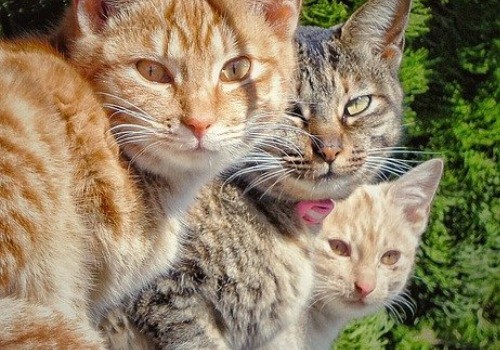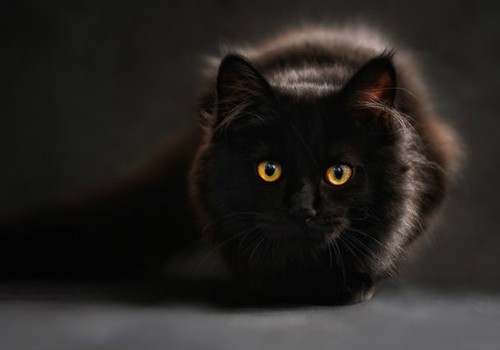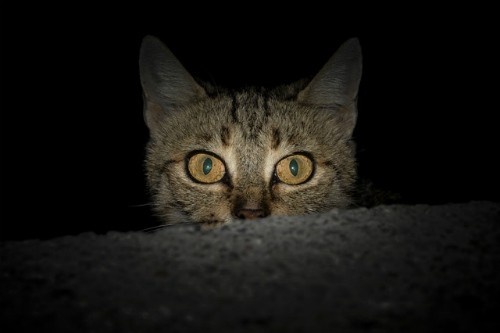Cat owners often marvel at the ability of their cat to nap nearly anywhere. A tabletop, windowsill, or basket of fresh laundry are all adequate sleeping quarters for a feline. So, why is it, then, that a cat seems to be unable to find anywhere to settle at night?
One of the most common complaints of cat owners is their pet’s habit of spending the night streaking through the house, pouncing on people, and singing at the highest volume imaginable. What causes cats to become so much louder and more active at night? Is there any hope for sleep when a cat is in the house?
1. Instinctual Feline Behavior

Large cats living in the wild, as well as feral cats and domestic strays, are most active at night because that is when they hunt their prey. An adopted stray cat may find it challenging to adapt to a new schedule once it finds a new home. Even cared-for housecats allowed to be outside at night engaged in hunting or wandering may continue with their habits when they are back inside due to poor weather.
[amazon bestseller=”cat hunt toy”]
A pest in the house can awaken the hunting instinct in the cat. Mice and other rodents typically move around more at night, and this can excite the pet. Even nighttime creatures like bats or skunks seen through the window could encourage a pet to get into a rambunctious mood.
Domestic housecats are crepuscular (appearing or active in twilight) and not nocturnal. This means that a cat is most active during the hours of dawn and dusk. The types of animals that prefer the twilight hours include dogs, deer, and skunks.
The energy level of a house cat will often peak at dusk, and it may last well past the bedtime of their human housemates. During the evening or overnight, a cat may meow or make other sounds. Vocalizing is also a common behavior after dark because wild felines vocalize to their pack mates during a nighttime hunt.
Pet owners will struggle to find many options that help them to train away instinctual behavior. A possible solution is to close all the blinds at night so outside critters are unseen. A pest inspection can ensure that no mice or other creatures are residing anywhere in the home.
2. Possible Social Issues

Some cats are naturally shy or may startle easily due to past trauma. The darkness and quiet of the night may feel freeing to them. The cat may come out to burn energy at this time of the day because the quietness of the home and the emptiness of the living spaces make it feel safe.
[amazon bestseller=”Cat Camera Night Vision”]
A scared cat may also come out at night and make a lot of noise because it is looking for help. The meows from a young cat may be to their mother or littermates. A shelter cat may be seeking their prior animal friends or human.
The best choice is to work with the cat to make them feel more comfortable. Keep the home quieter and less intimidating to a shy animal. Initiate gentle physical contact over time and encourage the cat to sleep in the bed.
The contact with a trusted human can be enough to calm the animal and convince it to sleep. The hours spent together may even be enough to help it develop more confidence with the rest of the world. Talk to a veterinarian or pet behaviorist for advice if the cat continues to be fearful or has other behavioral problems like urine marking or aggressive behavior.
3. Concerns with Health
Health issues could be to blame for a cat that cannot sleep at night or one that is more vocal after dark. Mealtime, companionship and outside activity may keep an aging or unwell cat distracted enough during the daytime to forget their body aches or other problems.
Cats are also creatures that hide their illnesses well. The instinct to appear strong is one that protects cats in the wild because sick animals are a target of other predators. The cat may feel less inclined to hide its discomfort at night when they think no one is listening.
The potential for the nighttime activity to be health-related is higher when it is an older pet that has never displayed this type of behavior before. A health check is always a good idea when an animal of any age begins to show changes in their behavior or does things that seem out of the ordinary. A complete wellness check will rule out illness or injury or help diagnose a problem.
4. Reaction to Loneliness

Cats can feel abandoned or lonely when all activity ceases in a normally busy home. A well-loved pet may wonder why no one is available to keep them entertained, and the result is their attempts at self-amusement. Cats that play attack their owners during sleep or meow a lot at night are often trying to get attention and find someone willing to help them stay busy.
[amazon bestseller=”Basics warming cats bed”]
Make certain the animal gets plenty of attention during the day. A confident cat that knows it is loved is less likely to feel lonely at night.
Keep a radio or TV on at night in homes that are normally loud all day. The pet may be accustomed to the noise and miss it when it ceases. Choose a room away from the bedrooms for the distraction to encourage the cat to go to that space and leave people alone.
Another possibility is to try to quiet down the home gradually through the evening rather than have all the noise and activity cease at once. The pet may be less likely to become startled by the quiet when it happens over time. A slower pace in the evening routine can help the cat to settle down along with the humans, so it is also ready for sleep when bedtime arrives.
One solution that may not appeal to everyone is to get the cat a companion. Cats are not the independent hermits many people think, and another cat in the household could be the cure for loneliness. A playmate will also help to wear out the cats so they can sleep better at night.
5. Response to Training
Human behavior could be to blame for the nighttime feline activity. Many cats spend 8 – 10 hours a day alone as their humans work and go to school. Cats nap, stretch, eat, and repeat that routine for hours without taking part in any tiring activity. The human inhabitants arrive home in the evening, eat their dinner, and then often spend a little time winding the cat up by playing with them just before bed.

The cat has only begun to wake up and become energized at the same time as the people in the house are preparing to tuck themselves into bed. Left alone again, the now wide-awake kitty tries to rouse everyone to join it for more fun. The cat may even see the responses of the human, to hide under blankets or push them away, as part of the play.
Change the schedule by making certain the animal has plenty of activity during the daylight hours so they burn off some of their energy. Leave the curtains open and hang a bird feeder in the window, buy a fish tank for them to watch, or leave out interactive toys that the cat will find hard to ignore. Hire a pet sitter to visit mid-day and engage the animal to give them something to do instead of sleep.
Reschedule playtime with the cat to the morning hours or the early evening before dinner. Pet parents that play with their cat after dinner only help to excite the animals just before bedtime. Cuddle and give other quiet forms of attention to the cat in the evening so they still get the same amount of attention.
6. Rewards for Behavior
Cats are intelligent creatures that learn that annoying their human will get them what they want. Many people wake up and play, pet, or feed their cats at night. The cat eventually realizes that the response to unruly behavior is something wonderful.
Understandably, humans need their rest at night and want to get back to sleep as soon as possible. The best solution may seem to be to give the cat what it wants so it will go away and quiet down. Unfortunately, most cats become more demanding over time and may wake their human more often if their behavior results in a reward.
The only solution is to ignore the cat rather than rewarding it for its misbehavior. It can take a few days or longer to retrain the pet, and its behavior will often get worse during those days. Close all bedroom doors, turn on a fan to drown out the noise, and stay committed to retraining no matter how insistent the animal becomes.
7. Fulfilling a Need
If the pet behavior happens in the early morning hours, the animal may be hungry and need an earlier breakfast than its human peers. Invest in a timed feeder rather than try to stumble to the kitchen at 4 AM to put out more food. Chances are, once the pet becomes accustomed to the feeder, it will eat and go back to sleep.
[amazon bestseller=”cat timed feeder”]
Cats sleep, on average, as much as 16 hours a day. The frustrating fact for many cat owners is that the eight hours of their awake time always seems to be when humans need to rest. It may take several tries to find the method that works best for your cat, but a solution is possible.
Are Your Cats Most Active at Night? (Video)
"In ancient times cats were worshipped as gods; they have not forgotten this."
-- Terry Pratchett





